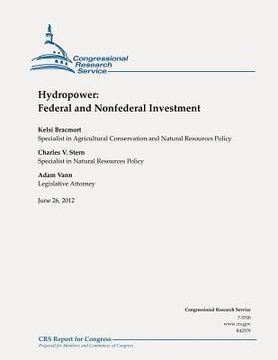Reseña del libro "Hydropower: Federal and Nonfederal Investment (en Inglés)"
Congress is examining numerous energy sources to determine their contribution to the nation's energy portfolio and the federal role in supporting these sources. Hydropower, the use of flowing water to produce electricity, is one such source. Conventional hydropower accounted for approximately 6% of total U.S. net electricity generation in 2010. Hydropower has advantages and disadvantages as an energy source. Its advantages include its status as a continuous, or baseload, power source that releases minimal air pollutants during power generation relative to fossil fuels. Some of its disadvantages, depending on the type of hydropower plant, include high initial capital costs, ecosystem disruption, and reduced generation during low water years and seasons. Hydropower project ownership can be categorized as federal or nonfederal. The bulk of federal projects are owned and managed by the Bureau of Reclamation and the U.S. Army Corps of Engineers. Nonfederal projects are licensed and overseen by the Federal Energy Regulatory Commission (FERC). Considered by many to be an established energy source, hydropower is not always discussed alongside clean or renewable energy sources in the ongoing energy debate. However, hydropower proponents argue that hydropower is cleaner than some conventional energy sources, and point to recent findings that additional hydropower capacity could help the United States reach proposed energy, economic, and environmental goals. Others argue that the expansion of hydropower in the form of numerous small hydropower projects could have environmental impacts and regulatory concerns similar to those of existing large projects. Congress faces several issues as it determines how hydropower fits into a changing energy and economic landscape. For example, existing large hydropower infrastructure is aging; many of the nation's hydropower generators and dams are over 30 years old. Proposed options to address this concern include increasing federal funding, utilizing alternative funding, privatizing federally owned dams, and encouraging additional small-capacity generators, among other options. Additionally, whether to significantly expand or encourage expansion of hydropower is likely to require congressional input due to the uncertainty surrounding the clean and renewable energy portfolio within power markets. Potential expansion of hydropower projects could take place by improving efficiency at existing projects or by building new projects, or both. Congressional support for this approach is evident in the House passage of the Bureau of Reclamation Small Conduit Hydropower Development and Rural Jobs Act of 2012 (H.R. 2842). Senate activity on this matter includes the Hydropower Improvement Act of 2011 (S. 629), which proposes to establish a grants program for increased hydropower production, and to amend the Federal Power Act (FPA) to authorize FERC to exempt electric power generation facilities on federal lands from the act's requirements, among other things. Another issue is the rate at which FERC issues licenses for nonfederal projects, which is slower than some find ideal. The licensing process can be delayed significantly as stakeholders and the approximately dozen federal and state agencies involved give their input. FERC responded by developing a more streamlined licensing process in 2003. Still, some object to "mandatory conditions" that federal agencies can place on new or renewed hydropower facilities. The 112th Congress has introduced roughly 25 bills regarding hydropower, a quarter of which are state- or site-specific legislation.

